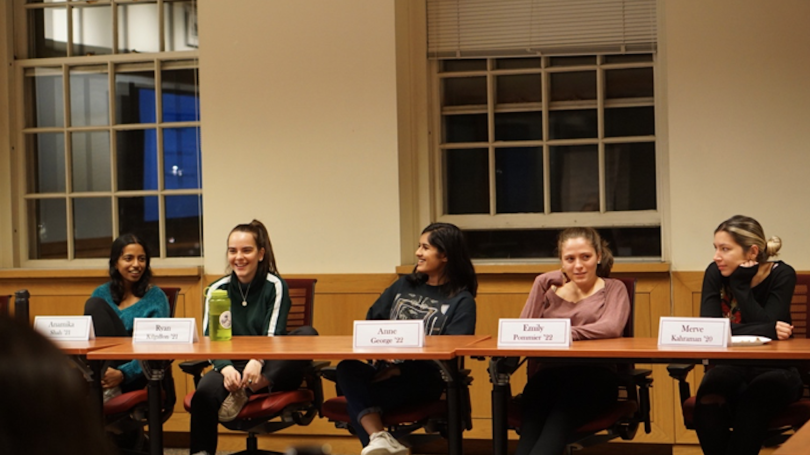
- Public Policy
- Leadership
- Funding
- News & Events
- About the Center
Back to Top Nav
Back to Top Nav
Back to Top Nav
Back to Top Nav
Each fall, winter, and spring, the Rockefeller Global Leadership Program (RGLP) brings together student leaders to increase their understanding of global leadership and intercultural competency. Through weekly sessions with speakers and a culminating experience to either Boston or Montreal, the students are able to learn about themselves and cross-cultural leadership.
Fall 2019 participants were asked to write a blog post, reflecting on the topics and lessons learned throughout the program. Below are reflections from the Fall 2019 cohort who spent a weekend in Montreal as part of their culminating experience.
As college students, ambiguity is often discouraged. Our essay’s thesis statements should be precise, our mathematical proofs should detail step-by-step problem solving, and our midterm short answer questions should get to the point quickly and effectively. Yet, despite the academic trends of villainizing inexactness, ambiguity has a distinctive role in creating and maintaining effective cross-cultural relationships – a skill necessary not only in the workplace but in daily life as well.
Before I continue, a clarifying note. It is easy to paint cultural relationships as related primarily to geographic culture (i.e. American, South Asian, European, etc.). As I learned through RGLP, however, culture is not limited to spatial understandings, exemplified in particular by our presentation on Deaf culture during our group trip to Montreal. Culture could refer to communities as niche as Dartmouth or as all-encompassing as the Western world, merely indicating the unique customs, social institutions, and achievements of a community.
All of our personal cultures are distinct because our identities are multidimensional. While my own genetic makeup categorizes me as Irish, Italian, and Puerto Rican, I am legally considered a citizen of the United States and Ireland. On smaller scales, I consider myself a woman, a student, a big sister, and a city dweller along with countless other identifiers. Each of these aspects contributes to the way I make meaning of what’s around me. The point is, it is impossible to boil down someone to a singular identity and, by extension, a single culture.
This simple fact can easily be leveraged within new and unknown encounters. Understanding the complex and interconnected nature of our own identities sheds light on the way we process cross-cultural experiences. We can use the spanning nature of our personal associations to connect to those with different identities, linking similar practices, habits, and values across our distinct personal cultures. As such, we can become more comfortable in unknown situations, and instead of fearing ambiguity, we can learn to embrace it for what it truly is: an opportunity to bridge the gap and create a meaningful connection.
-Written by Ryan Kilgallon ’21, Fall 2019 RGLP Participant
Disclaimer: The views and opinions expressed here are the author’s own and do not necessarily represent the views and opinions of the Rockefeller Center or constitute an endorsement by the Center.